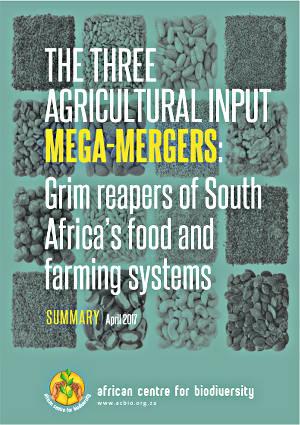Latest Resources

10 August 2017
The Water Efficient Maize for Africa Project: Profiteering not Philanthropy
This scoping study aims to appraise, to the best of our knowledge, the current status of the roll-out of a public- private partnership which forms the the Water Efficient Maize for Africa (WEMA) project in five African countries: Kenya, Mozambique, South Africa, Tanzania and Uganda. The partnership is between the African Agricultural Technology Foundation (AATF), […]

31 July 2017
No Safe Limits for Toxic Pesticides in Our Foods
On 7 April 7 2017 the South African government issued draft amendments to its regulations governing the legal limits for pesticide residues on food crops. The proposed amendments expose the gaps in regulations to date, despite the cultivation of herbicide-tolerant GM crops for almost two decades. As the African Centre for Biodiversity (ACB) team researched […]

18 July 2017
GM Cotton push in Swaziland: Next target for failed Bt cotton
This paper examines the application of the Bt cotton field trials currently underway in Swaziland. This is situated within the broader wave of GM application and trials across the continent, along with the weakening of national biosafety regulations, as part of the GM push across Africa. This paper is based on research on the Swaziland […]

5 July 2017
Decolonising Food Systems and Sowing Seeds of Resistance
The briefing paper challenges us to reclaim our connection to seed, food and each other and to engage in new food politics. Download pdf.

25 May 2017
South Africa and 2,4 D stacked GM maize: biosafety, socio-economic risks
In 2015–2016 Dow AgroSciences Southern Africa (Pty) Ltd performed field trials on maize tolerant to 2,4-D (event DAS-87078-9) and stacked varieties carrying not only 2,4-D tolerance, but also glyphosate tolerance and/or Bt insectidal toxins. The trials are on going in 2017. The trials follow the approval for import for food, feed and processing in 2012, […]

11 April 2017
Mega-mergers: 3 giant corporations controlling South Africa’s food and farming systems
This briefing deals with the three mega mergers taking place in the agriculture sector as Dow Chemical and DuPont are set to merge, China National Chemical Corporation (ChemChina) is to acquire Syngenta and Bayer is to acquire Monsanto. The proposed Bayer-Monsanto merger will give control of almost 30% of the world’s commercial seed market and […]

28 November 2016
Biosafety aspects of genome-editing techniques
Biosafety TWN Briefing – Biosafety aspects of genome-editing techniques. You can download the paper here.

30 June 2015
What next after a ban on glyphosate – more toxic chemicals and GM crops?
This briefing calls for a ban on glyphosate and that other toxic herbicides, such as 2,4-D and dicamba must similarly also come under urgent review and that adequate measures must be put in place to ensure that more toxic chemicals do not replace glyphosate.

23 July 2014
Peddling for Profits: Pioneer Hi-Bred’s redundant rootworm-resistant GM maize coming soon t...
In this briefing, we show how SA’s biosafety regulatory system favours profits over sound biosafety practise as the regulators have authorised field trials of a GM maize variety to combat a pest, the corn root worm that does not exist in SA at all and will not, for 100 years!! Read here.

20 May 2014
GM Contamination, Cartels and Collusion in South Africa’s Bread Industry
This briefing paper exposes the high levels of GM soya in South Africa’s popular white bread brands and reveals how just four companies – Tiger Brands, Pioneer Foods, Premier Foods and Foodcorp control the Wheat-to-Bread value chain. This value chain feeds into another concentrated retail food market controlled by Shoprite/Checkers, Pick n Pay, Woolworths and […]
